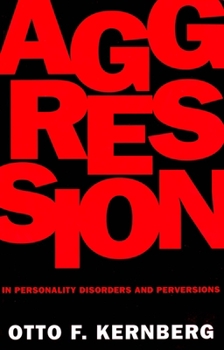Aggression in Personality Disorders and Perversions
Select Format
Select Condition 
Book Overview
In this important new book, Dr. Otto F. Kernberg, one of the world's foremost psychoanalysts, explores the role of aggression in severe personality disorders and in normal and perverse sexuality, integrating new developments in psychoanalytic theory with findings from clinical work with severely regressed patients. The book also integrates Dr. Kernberg's recent studies of the descriptive, structural, and psychodynamic features of problems stemming from pathological aggression with the vicissitudes of their psychoanalytic treatment. Finally, Dr. Kernberg demonstrates the importance of differential diagnosis for effective psychoanalytically inspired treatment of these disorders, providing a rich variety of clinical illustrations. The book begins by relating the dual-drive theory of libido and aggression to contemporary developments in affect theory. Dr. Kernberg then applies this general theory of affects to aggression, which in its pathological form centers on the affect of hatred. He analyzes sado-masochistic, hysterical-hysteroid, and narcissistic-antisocial spectrums of personality disorders, emphasizing how aggression is structured in each group. Dr. Kernberg next describes and updates the theoretical frame underlying his approach to the treatment of these disorders, outlines their clinical manifestations, and illustrates their diagnosis and treatment, ranging from standard psychoanalysis with infantile personalities, to psychoanalytic psychotherapy with borderline personalities, to the psychotherapeutic approach to the treatment of psychosis and hospital milieu treatment in the management of highly regressed patients. In the final section, Dr. Kernberg links the findings from psychoanalytic approaches to personality disorders with those from the psychoanalytic study of sexual perversions.
Format:Paperback
Language:English
ISBN:0300065086
ISBN13:9780300065084
Release Date:September 1992
Publisher:Yale University Press
Length:326 Pages
Weight:1.05 lbs.
Dimensions:1.0" x 5.9" x 8.8"
Customer Reviews
3 ratings
The Infant and the Deviant
Published by Thriftbooks.com User , 22 years ago
Kernberg has arguably contributed more than anyone - even more than Kohut - to the understanding of borderline conditions and pathological narcissism.He is both a formidable theoretician and an outstanding clinician. This - a small part of his prodigious and erudite output - is a detailed and scholarly study of the role played in the dynamics of relationships by narcissism, aggression - both self-directed (as in masochism) and other-directed (as in sadism) - and the resulting perversions. It is disturbing to learn how central the role of hatred, envy and other transformations of aggression is in relationships and in antisocial behavior. There is a direct path from regressive infantilism to psychosis and sexual deviance (and one may add to political oppression). This tome is one of the best anatomies of psychological defenses gone awry. Sam Vaknin, author of "Malignant Self Love - Narcissism Revisited".
Excellent book on aggression
Published by Thriftbooks.com User , 23 years ago
Excellent book, author is an expert in narcissistic defenses and agression, but other personality disorders are also well covered. Kernberg deserves credit because personality disorders are difficult to describe because they are so disorganized, dishonest, and chameleon-like. The analysis of aggression in relationships is valuable for people in many fields. Kernberg provides wonderfully candid descriptions of his own negative or inappropriate feelings towards patients, cases where pateints refuse to cooperate with treatment, and cases where these patients manage to use hospital politics (!) to thwart treatment. My initial impression was that there seemed to be a bit too much jargon and the subsequent hair-splitting. As I read it, time and again I summarized long paragraphs by jotting down 5 to 10 words in the margin. But he does so as part of thorough overview of difficult literature, and considering the amount of ground he covers, this book could have been much longer. Odd he doesn't mention Facism, when the description of violent narcissistic sadists who embrace tyrants is so evocative of strutting Nazis. And his final chapters on perversion versus healthy sexual function is strikingly similar to Krafft-Ebing's "An Attempt to Explain Masochism," who reached their conslusions long before Freud and developed a clearer definition of healthy functioning than Freud.
a treasure trove of clinical wisdom
Published by Thriftbooks.com User , 24 years ago
Kernberg brings his clinical acumen and unique blend of ego psychology and object relations to bear upon the problem of aggression, particularly rage and its cognitively higher-level manifestation as hatred, in severe personality disorders.He begins by offering a sensible formulation of affect theory, a developmental model which the clinician can use as a checklist: when the patient approaches an area of emotional sensitivity, is his affect primitive and disorganized or evolved enough to appear as an emotion? Is the somatic component there? The cognitive? And, since affect involves an object, is the object relation there too? If not, how far from consciousness? What defenses protect it?The book is organized into sections on the role of affects, developmental aspects of broad-spectrum personality disorders (not necessarily (thank God) in the DSM sense), clinical applications of object relations theory (discusses the transference, structural change, and other such considerations), technical approaches to severe regression, and the dynamics of sexual perversion.In this last section, Kernberg mentions that per classic analytic thought, homosexuality = unresolved Oedipal conflict. The man who loves a man is actually submitting to dad and thereby failing to identify with him and grow up. Explaining that the biological and clinical evidence is not yet in, Kernberg states, honestly enough, that in his clinical experience few homosexual men fail to present significant character pathology. But would a psychologically mature homosexual want to do therapy to begin with, especially within a tradition known to see homosexuality as infantile? And if the "I've always been like this" explanation given by my clients is true--and I think it is--then how is one to entirely escape significant pathology while growing up gay in a homophobic society? Unfortunately, these questions are not addressed in this otherwise indispensable work.An extra gift is the author's obvious willingness to see beyond even the most destructive behaviors to the sense and suffering at their core.





